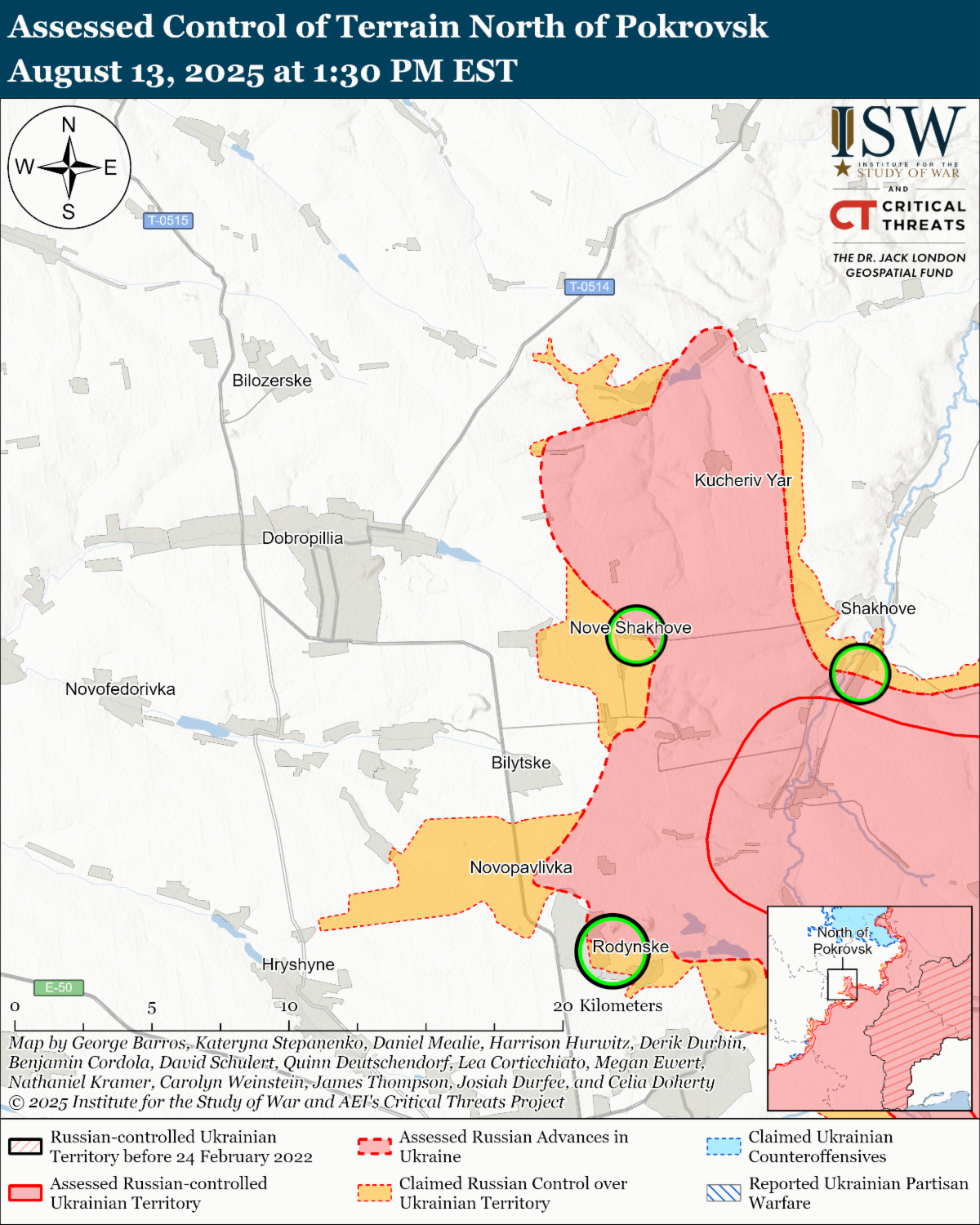Russian officials reiterated that Russia's objectives in Ukraine remain unchanged ahead of the Alaska summit on August 15, once again demonstrating that the Kremlin remains uninterested in pursuing serious peace negotiations. Russian Foreign Ministry's Deputy Director of Information and Press Department Alexei Fadeev stated on August 13 that Russia’s position on resolving its war against Ukraine remained “unchanged” since Russian President Vladimir Putin’s June 14, 2024 speech. Fadeev added that the goals for Russia’s delegation to the Alaska summit on August 15 are defined “exclusively by national interests” and implied that Russia will not consider any territorial concessions. Putin outlined his uncompromising demands for Ukraine's capitulation as a prerequisite for "peace" negotiations in Ukraine on June 14, 2024. The demands included that Ukraine must withdraw from the entirety of Luhansk, Donetsk, Zaporizhia, and Kherson oblasts, including areas that Russian forces do not currently occupy; demilitarization; and denazification of the Ukrainian government and society, including the removal of Ukraine’s current democratically elected government; and future Ukrainian alliance neutrality, likely referring to NATO membership. Fadeev’s statements indicate that the Kremlin maintains its long-standing objectives in the war against Ukraine that amount to Ukraine’s full military and political capitulation to Russia and has not adjusted its position ahead of the Alaska summit.
The Trump administration clarified that the United States will not pursue any agreements with Russia regarding a peace settlement in Ukraine without an immediate ceasefire and without Ukraine's formal involvement in peace negotiations. US President Donald Trump held a virtual summit on August 13 with select European leaders and Ukrainian President Volodymyr Zelensky in preparation for Trump's meeting with Russian President Vladimir Putin at the August 15 Alaska summit. German Chancellor Friedrich Merz stated that Trump reaffirmed that Trump would not negotiate territorial issues with Putin. French President Emmanuel Macron noted that Trump clearly demonstrated that the United States seeks to convince Putin to commit to a ceasefire during the Alaska summit. Macron added that Trump agreed that no one but Zelensky should negotiate issues concerning territory and that Trump will not be engaging in any "schemes for territory swaps" during the summit. Macron stated that Trump accepted that the United States and Europe will need to jointly give Ukraine security guarantees but made it clear that these security guarantees would not involve NATO. Two unnamed meeting participants told the Wall Street Journal that Trump pledged to ask Putin for an immediate ceasefire but expressed doubts that Putin would agree to this condition.
Trump reiterated US interest in facilitating future Ukraine-Russia peace negotiations and warned that Russia would face "very severe consequences" if Putin fails to engage in serious peace talks with Ukraine after the Alaska summit. Trump stated after his virtual summit with European leaders and Zelensky on August 13 that he hopes to organize a trilateral meeting with Putin and Zelensky in the event of a successful Alaska summit. Trump warned that there will be "very severe consequences" if Putin does not agree to stop his war against Ukraine after the Alaska summit but did not specify those consequences. US Secretary of Treasury Scott Bessent told Bloomberg on August 13 that the United States could increase or loosen sanctions against Russia depending on the outcome of the Alaska summit. Bessent urged European leaders to prepare to join the United States in introducing harsher sanctions against Russia and tariffs against the People’s Republic of China and other consumers of Russian energy. One US official told Axios on August 13 that the Trump administration believes that it can "bring down the Russian economy" and that Trump will continue to sell weapons to NATO countries for Ukraine even if diplomatic efforts to resolve the war fail. | 





 [국방부] 국방부장관, 미국 하원의원단 면담
[국방부] 국방부장관, 미국 하원의원단 면담
 [ISW] 러시아 공세 캠페인 평가, 2025년 8월 13일
[ISW] 러시아 공세 캠페인 평가, 2025년 8월 13일